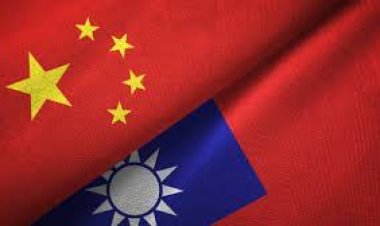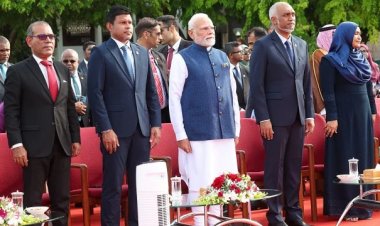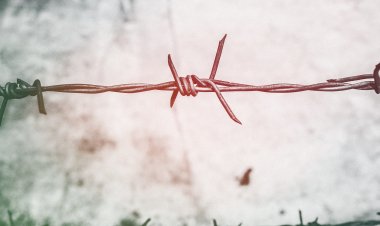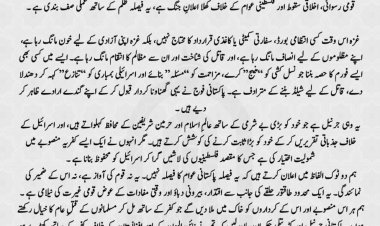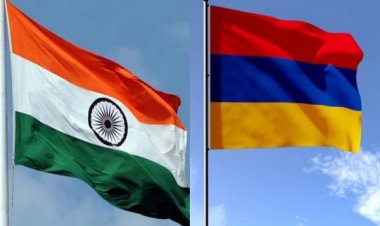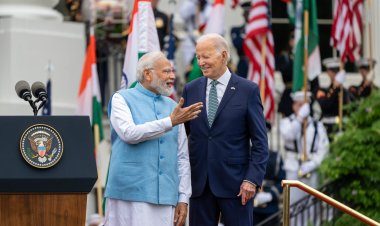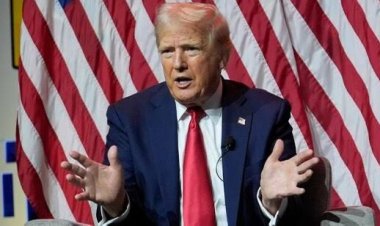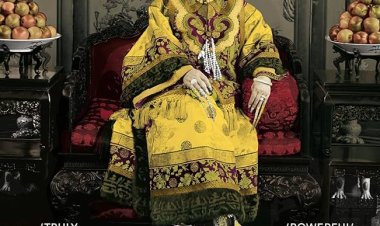Exclusive Interview with Mr. Frank Lehberger
Usanas Foundation brings you an exclusive interview with Mr Frank Lehberger as part of our new 'Quad and Quad Plus Dialogues'.

Usanas Editorial Team
Usanas Foundation had an illuminating interview with Mr. Frank Lehberger on issues pertaining to Tibet in the backdrop of the recent visit of President Xi Jinping to the region. The interview was conducted by Rushali Saha and covered a range of issues concerning Tibet, including the message behind Xi’s visit and Tibet in the context of Indo-Sino and Sino-US rivalry. During the interview, Mr. Lehberger also discussed the succession issue of His Holiness Dalai Lama and the Chinese design behind maintaining influence over religious affairs in Tibet.
Mr. Lehberger is a senior fellow at Usanas Foundation and a seasoned sinologist based in Europe. He is also a multilingual translator, author, political analyst and an expert China watcher. His work focuses on ethnic minority communities and human rights issues in China. He is fluent in four major languages with strong multicultural and multilingual communication skills. He has also authored several nonfiction books on China.
He has 30 years of professional experience as a political analyst and consultant in Asia, including Tibet. Currently, he is working in Europe as an independent consultant in his area of expertise. He specializes in analysis, linguistics, strategic foresight, sensemaking, strategic planning and threat assessment. Frank has also on numerous occasions proven his ability to navigate and deliver results in complex, politically sensitive, and unstable environments.
The transcript of the interview is as follows:
RS: President Xi Jinping’s sudden and dramatic visit to Tibet has captured headlines around the world, and rightly so as it was the first official visit by a Chinese leader in 30 years. According to you, what was the message Xi Jinping was trying to send through this visit?
FL: It was intended to send a clear set of signals to different recipients, both at home and abroad at the same time. So, the first one, the inspection tour was planned very well in advance. The members of the politburo now in China are also inspecting other provinces and they do this for the upcoming Communist Party of China planum this fall. So, all these members have to go somewhere in China. Then also next week, there is an informal gathering of all the big Communist Party of China guys in China. They usually go to a seaside resort called Beidaihe. In this place they all do this bickering and scheming; they meet and have these informal gatherings and they prepare this big planum in the fall. So, this is the first thing, they have to go everywhere.
And Xi chose Tibet because to ordinary Chinese Tibet is something very exotic and beyond the cloud and they don’t understand it. It’s part of China, but basically not many Chinese people speak Tibetan or they understand this place at all. So, the message from Xi to these ordinary Chinese is that ‘Xi Jinping is above everything’. He thrones in the pristine mountains where the sky is clear, where there is no rain, and the Chinese (people) down in China are drowning because there is a lot of rain, bad weather and typhoons, and thousands of Chinese died and drowned. But this doesn’t concern him because Xi Jinping is above all of this. So, he triumphantly told ordinary Chinese and also to his rivals inside the CCP that he has now managed to surpass the only other red pontiff before him, which is Mao Zedong. And Mao in his lifetime never dared to go to Tibet, so Xi Jinping is the first one (red pontiff). Mao also let millions of Chinese die because of hunger without flinching when he invaded India in 1962. There was a big famine in China, 30-40 million people died of hunger and it didn’t bother him at all. Xi Jinping is now sort of showing that I am like him. Also in 1975, when Mao was still alive, incidentally there was a big flood in Henan, the same place where people died last week. In 1975 also there was this same thing, there was a flood, dams were breaking, and there were 500,000 Chinese people who died in this flood. Mao didn’t say anything. So now Xi Jinping is showing Chinese people that I am even stronger, more powerful than Mao.
Then the message to the Tibetan Buddhists. He has a special message for Tibetan Buddhists, which is, ‘I am the red pontiff and you must worship me much more than any other Buddhist religious dignitary like the Dalai Lama of Tibet’. So how did he convey this message? He drove into Lhasa in an SUV. He came to Lhasa at the train station, where there is a train station, and drove into Lhasa. The whole town was confined, but on this road, while driving from the train station to Lhasa, he was flanked by two ranges of well-wishers. This was very well choreographed and these people were not Tibetans. They were dressed as Tibetans, but they were Chinese military or police disguised as Tibetans and several hundreds of them. And they were throwing red scarves, ceremonial Tibetan scarves on his SUV. In this picture, anybody who knows Tibet, who has been there, knows that only religious dignitaries who arrive in the Tibetan community are treated like this. They (religious dignitaries) arrive in a car, then people, the well-wishers, throw scarves on them, on the car. In 1989, the late 10th Panchen Lama, was also greeted like this by the Tibetans. The Tibetans know it very well, but the Chinese people do not know this. For ordinary Chinese, people dressed in black throwing white things on a car looks like a funeral. Because the Chinese don’t have this Tibetan Buddhist culture, so for the Chinese, this looks awkward. They associate white things thrown on a car with horrors or some symbol of mourning. This also happened in 1975 when Zhou Enlai, the second after Mao Zedong in China, died with illness, cancer, and Chinese people in a show of defiance made the same white things and threw them. And Mao didn’t like it because he hated Zhou Enlai, but he needed him. So, this reminds the Chinese, what’s going on. Promptly also, irreverent Chinese netizens on the Chinese internet sarcastically asked, 'Is this Xi Jinping funeral, what does this mean?’So, for Chinese people it's totally bizarre, it makes no sense. But for Tibetan Buddhists, it makes sense because Xi Jinping is the big pontiff and he is a religious figure now.
Also, to the west. This shows to the people in the west, ‘look Xi Jinping is loved by the Tibetans, what do you want? What do you have to criticize? Xi Jinping is loved by them even more than the Dalai Lama. So shut up, it’s nothing like this'.
Then other signals to ordinary Tibetans (working for the Chinese government or members of the communist party) who are not Buddhist. For ordinary Tibetans, it is like that now you have to stay at home, there is martial law everywhere and stringent confinement at home. This is also going to happen to you if you are not toeing the party line. Xi Jinping on his trip was also accompanied by his public security vice minister Wang Xiaohong, who is a big confidant of Xi. This Mr. Wang Xiaohong, the police minister like the Chinese Gestapo, was putting a security blanket over the whole of Tibet. So, Tibetans had to stay at home. You can’t make any phone calls, you cannot do anything, you have to lie down, you cannot go to the window and things like that. This showed the ordinary Tibetans who are not Buddhist that we are watching you even more.
Then another signal is now to India, to the government and army of India. The signal to India was raw military intimidation. Why? So, Xi Jinping first stop was in Nyingchi, just 100 km north of the India border, opposite Arunachal Pradesh. He arrived with his plane and he took the train, and this train line is totally new. This is the train line from Chengdu to Lhasa and this railway line is strategically important because, in any military operation against India, this line will be crucial for logistics. And in 1962, you know the Sino-Indian war, the Chinese attacked Arunachal Pradesh and took a big chunk of it. They had prepared for this for nine months, logistics, but they had miscalculated and hadn’t prepared enough. They didn’t have any railway line at that time so they had to stop the incursion into Arunachala and it was impossible for the Chinese army to continue the intrusion, so they had to go back. So, Xi Jinping goes there to show India that ‘now we have a railway line, we don’t have the problems of 1962’. Then in Nyingchi, in the east-southeast Tibet place, there is also the Yarlung Zangbo, this big Tibetan River which turns into the Brahmaputra. There the Chinese are building bridges, mega-dams, all these water diversion schemes. Also, this is to show India that now we control the waters, the headwaters of the Himalayas. China wants to weaponize the waters of the Himalayas against India. So, this is to show India, ‘we have the railway lines and we control the water’. So, this is a ‘not-so-subtle’ warning.
What else? No other Chinese communist party boss in the last 30-40 years took so many military people with him. So, Xi Jinping travelled there with the second highest military general in China. His name is Zhang Youxia and he is one of the two central military commission vice chairmen of China. And why this Zhang Youxia and not the other one? Because Zhang Youxia is an old childhood friend of Xi Jinping. Because their parents were friends, Xi Jinping and Zhang Youxia grew up together. So, Zhang Youxia is seen in the photo driving in the same luxurious carriage from Nyingchi to Lhasa. As a German, who is aware of our dark history, this reminds me of World War II, when Adolf Hitler is shown in his special armed railway train, luxurious railway train called Amerika, and Hitler chatting with his generals and his second in command Hermann Goring. Exactly the same setting in China and World War II. So, you can see. And when arriving in Lhasa what did he do? He had a big military gathering with all the biggest military brass in western theatre command, which encompasses Xinjiang, Tibet and other places. This theatre command is huge and he met with all the main generals there. One of those is the new and powerful military boss in charge of Tibet, his name is Xu Qiling. He featured prominently in this gathering and this general Xu is the third military boss in the last ten months that Xi has fired and hired again in this theatre command. And why did he fire three? Because it has to do with last year’s humiliating defeat in Galwan valley. So, this is the military component. Xi Jinping also said ‘we have to prepare to fight a war’ in this gathering. He didn’t name India, but he doesn’t have to. So, this is basically the answer to your first question.
RS: As India-China tensions grow and turn violent after the Galwan clashes, China has begun to raise Tibetan Militia groups, while the Indian Army trains the Tibetan Special Frontier Force. Do you see Tibet being sandwiched in this military contest between China and India?
FL: Yes! But I am still optimistic. I am very optimistic that it’s not going to be sandwiched because there is a problem that the Chinese do not trust the Tibetans. I will try to elaborate on this. Tibetans are minority people in China and the Chinese (Han) are the majority. They don’t trust each other. But there is a minority of Tibetans who are actively collaborating with the Chinese to do their bidding or for personal gains. They are opportunists basically. But the Chinese also know this, so they distrust them. The Chinese know that there are many opportunists and they even have a name for them, the Chinese call them Liangmian Ren or two-faced person. And the Tibetans have the same - Ko Nyiwa, which also means the two-headed person or two-faced person. So, Tibet is full of those. This is why the Chinese trying to sandwich Tibet is not going to work because most Tibetans are not working for the Chinese. Only if coerced or if they are opportunists, and the Chinese know this. And there are not many Tibetans in positions of power in China or in Tibet. Very few. If there are Tibetan people in power in Tibet, there are always people chaperoning them or supervising them.
The Chinese want to have Tibetans in the army, not in the Militia. The Chinese militia is something in a supporting role, but they want Tibetans in the army. But this is also not working. They have tried for decades, I know this, I have seen this in Lhasa. They try to lure people with money, the poor people. Then they have to become soldiers and they understand that this is not from them. So, they drop out or they don’t go there anymore. They don’t do the full training and they leave before they are soldiers. The PLA has more than 1 or 1.5 million troops, but only 1 dozen Tibetans hired officers, with the highest rank is Major general, not even a full general. Smaller colonels, captains or something, there are more, but high-ranking officers are only a dozen. Not all of them are even in the field army, some officers are even window dressing. So, the Chinese, don’t trust the Tibetans. All these recruitment by Chinese in schools and colleges all these years has not worked. But now there is a rumour, I heard something, I cannot confirm it right now. The Chinese are saying that every Tibetan family has to provide one able-bodied son and send him to the army, and this guy has to go there and he cannot leave. Tibetans don’t like this because they are discriminated against in the Chinese army. They speak Chinese with a very thick accent and the Chinese (soldiers) make fun of them. So, there is discrimination and racism, Chinese racism against the Tibetans, and the Tibetans hate it. There is always a problem between the ethnic Han Chinese and the Tibetans. So, I don’t think it will work. But they will do some model Tibetans units, maybe fake Tibetans, not even the real ones, but to show India that we also have a big army unit or something like this. But I think it is much more a show they are doing and even if many Tibetans know how to use or handle arms, it also becomes very dangerous because these guys could revolt against China. So, I think it’s half and half, half propaganda and half real.
RS: We are living in the era of intensified geopolitical competition between the U.S. and China. Do you see this bilateral competition as impacting the dynamics of the contest over Tibet?
FL: We have seen this contest already between the US and China, this geopolitical competition, but it’s mainly in the South China Sea or Taiwan Strait. Sure, but it is also intensifying in Tibet and we should not forget what is going on in Afghanistan right now. The Biden administration suddenly pulled out last month and everybody was astonished. Maybe this is also linked to this decision by the Americans. I don’t know, it could be linked to what’s going on right now in Tibet or in the South China Sea or Taiwan. I myself think that pulling out by the Americans is premature. But the Americans also have some advantages, they are gaining some advantages by this. So why is this competition between China and America increasing now? I think it’s 90 per cent the fault of Xi Jinping. It’s not the fault of Trump, the previous administration, it’s not the fault of Biden or Blinken, it's 90 per cent Xi Jinping because he is a dangerous irredentist revisionist. You know irredentist, you have some places that belong to you and you lost them and now you want them back or something. We had many dictators in Europe, here in Germany, in fascist Italy, they were all irredentist. So, Xi Jinping basically is the same person. He wants to change the current world order. He doesn’t just want Taiwan or Arunachala back; he wants to change the world order. So, this makes him very dangerous you can say. And let’s not forget Xi Jinping when he was young. He was a red guard. And what are red guards? they are sort of Communist Taliban; they are non-Muslim Taliban. So red guards were sort of terrorists, communist terrorists. And they terrorized who? They terrorized CCP higher-ups. Xi Jinping was one of those guys in his youth and now he wants to do something very flamboyant and destructive in the international order, which they don’t like anyway the Chinese.
So, Trump in 2017 made a very robust approach vis-à-vis the Chinese actions in Tibet. For instance, he passed the American Tibet Policy and Support Act (TPSA) just last November (2020). This law protects freedom of religion in Tibet and freeing Tibetans Buddhists from interference and encroachment by the atheist Chinese state. Do they do this? They Punish Chinese officials who are involved in this interference and they punish these officials using the Global Magnitsky Act. So, all those in China who actively interfere with the freedom of worship and religion are sanctioned according to this Magnitsky Act. They cannot use US dollars anymore or they cannot have any bank account anywhere in the world. Sadly, only one person in Tibet has been sanctioned like this and it’s the former CCP party secretary of Tibet. His name is Chen Quanguo, and he is not in Tibet anymore. But he is the only and the first Chinese official sanctioned according to this law. China on the other hand, the Chinese government, they have laws telling every government official to interfere into Tibetan Buddhism. So, these two laws (contest) against each other – the Chinese say you must interfere and the American say you cannot interfere.
What I heard, the Americans already helped the Indian troops in Galwan. They helped them with training, equipment and other nonmilitary support. So Americans already helped India, I don’t know if it’s true, but I have heard it. So, the Chinese also want Indian territory, you know in the western, central and in the eastern sector of the LAC. They want this. The Belt and Road Initiative (BRI) also plays an important role because of the railway line I told you about just before, and this would also extend to Pakistan and Central Asia. For them, BRI is very important so they want to control everything.
Then these claims on Arunachal Pradesh and on Doklam and other places. It’s very dangerous. The Chinese now have the willpower and means to do what they couldn’t do in 1962. And America is already involved somehow and I am sure it’s going to continue because of what the Chinese do. This is not because Americans are bad imperialists or they want to interfere in India or Tibet. No! They want to help. But the ones who interfere are the Chinese.
RS: The question of succession of the Dalai Lama is not just a spiritual matter, but also a deeply political question as he is the political leader of the community worldwide. Do you see this issue becoming a geopolitical one with the U.S., China, India staking their claims?
FL: This is a very tricky question. This is a spiritual and religious matter and I can just make an overall assessment or comment. The democracies like India and the US, usually do not unduly interfere in religious matters. So, there is a claim that America has no claim. America and India, both can deter China, not to interfere or abuse innocent young children who are candidates for the next incarnation of the Dalai Lama. The Chinese have a law also, the reincarnation law. They manipulate the succession line of these important Tibetan reincarnations, not only the Dalai Lama. So, India and the USA can help prevent this from happening when the time comes, hopefully not too soon, when Tibetans will need to choose the new Dalai Lama. And it’s also not sure there is a next Dalai Lama because His Holiness, the present Dalai Lama, has not made the decision yet if he is going to reincarnate or how. Nobody knows, only himself, and he has not made a decision yet. So, in this case USA and India can only be instrumental to enforce that China respects the wishes of His Holiness. In case His Holiness chooses to reincarnate, he already said it’s certainly, not sure, but it’s certainly in a free country, and not in a country controlled by China or inside China. Then the central government in New Delhi could perhaps protect or facilitate certain security measures, I don’t know, to help Buddhist dignitaries to search for a new incarnation, a small child inside Indian territory.
Now the geopolitical component into all this is when China somehow manages to impose a fake Dalai Lama on Buddhists. This would be a worst-case scenario. This means that Buddhist adepts and disciples in India would need to venerate a person who is influenced, indirectly, by the communist masters in Beijing, who are behind this fake Dalai Lama. They do this of course with ulterior motives which surpass religion. So, as India regards Buddhism and local communities as soft power, I do not believe that the Indian government could allow the neighboring atheist communist party to completely control the Buddhist community in India. I am sure this is the worst-case scenario and it has already happened. Now the current 11th Panchen Lama is a 30-year-old young person and he was chosen by the communist party, and the Tibetan Buddhists regard him as a fake Panchen Lama. The real Panchen Lama is also 30-year-old, but he is in confinement, he is like in a prison and nobody knows where he is. This fake Panchen lama is used by Beijing as a propaganda tool and unfortunately for him, he has morphed into the willing tool of Beijing. So, in my humble opinion, the Indian government shouldn’t let him near India in some conferences or something like this. This person is a tool of propaganda for United Front work on Buddhists.
So another geopolitical component is if China tries to annex or invade the border territory of India that has traditionally been home to large Buddhist communities and home to important Tibetan Buddhist religious centers, monasteries you know. There is one center that is important in Arunachal Pradesh and it’s called Tawang monastery. Tawang monastery is just high up on the border. This monastery is quite old and it was the birthplace of the 6th Dalai Lama in the 17th century. So, any future Dalai Lama, if he is chosen, could theoretically be recognized from this place again, and also get educated if he grows up there. Now Tawang is so close to Doklam and Siliguri, you see the Chinese invasion of this place would kill two or three birds in one go. So Tawang is a very important place geopolitically. It’s a small town on the border, but because of history and because of this monastery and because of the geography, these three things come together that make it the prime candidate for Chinese geopolitical incursion or some geopolitical plot. So, I am pretty sure, the Chinese want to have Tawang. They wanted to exchange it (post-1962 war) against something like, okay I am not sure there, they wanted to exchange it with other places in western areas in Ladakh somewhere. But the Indians said, ‘no! no! because in Tawang there are people living there and there is a monastery, so we cannot give this place back’. Although the Chinese wanted it, India very politely said no. I am not sure, but that’s what I heard. But the Chinese will not relent because this is so important geopolitically. So, I am quite sure they want this place.
Disclaimer: All opinions expressed in the webinar belong to the speakers and are not reflective of Usanas Foundation.



